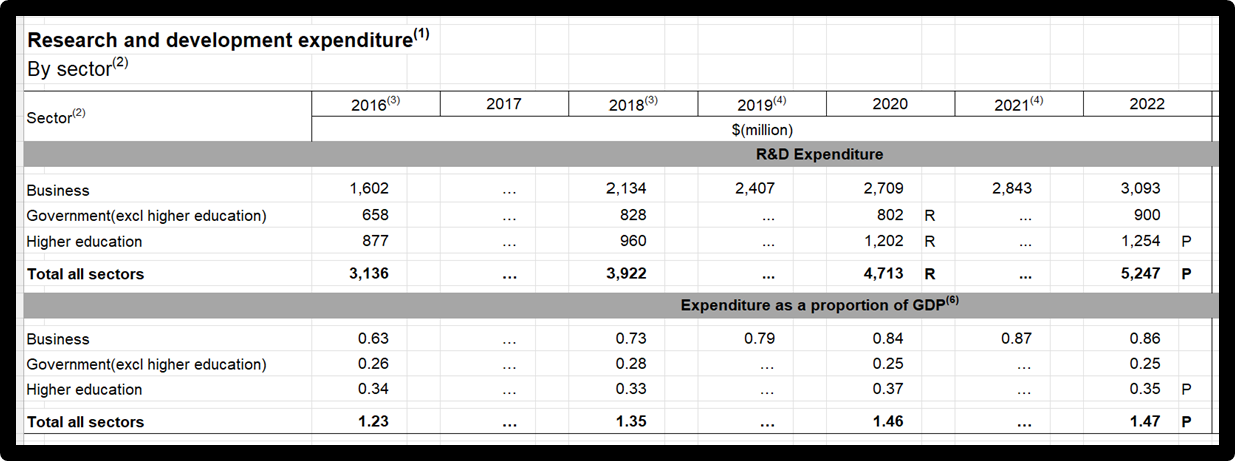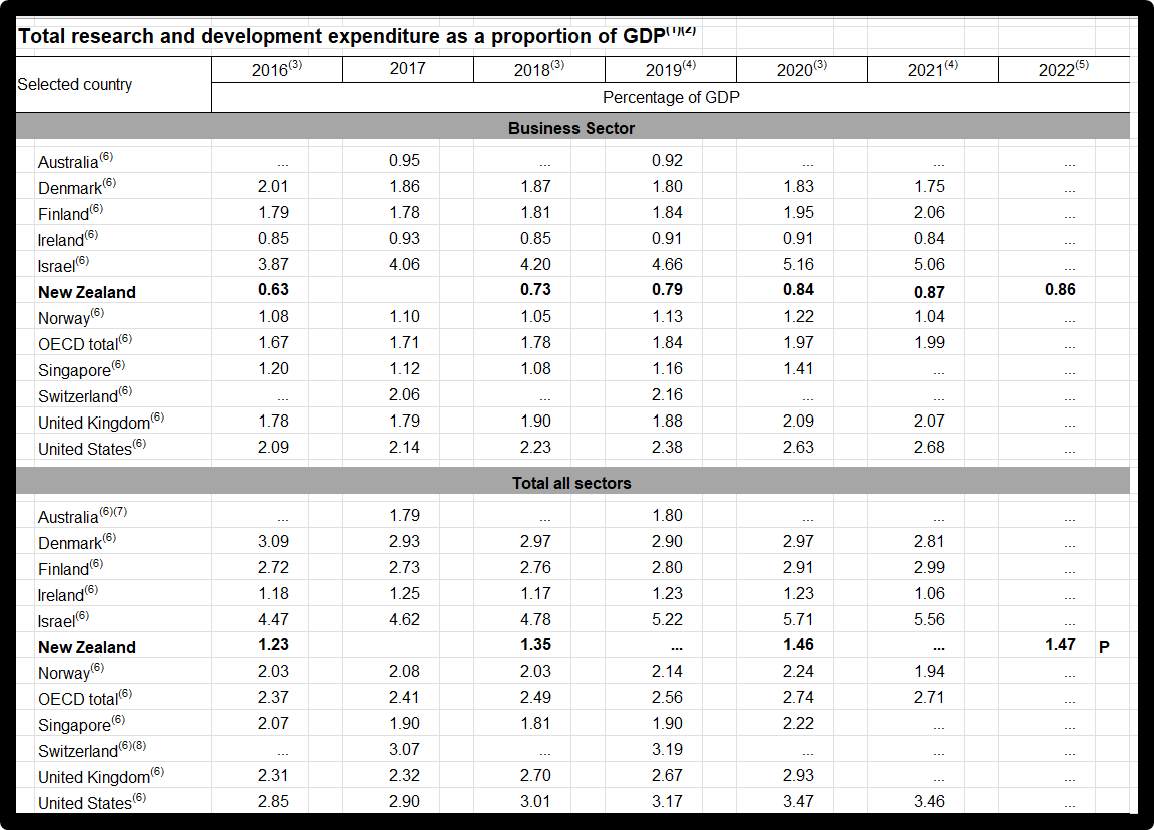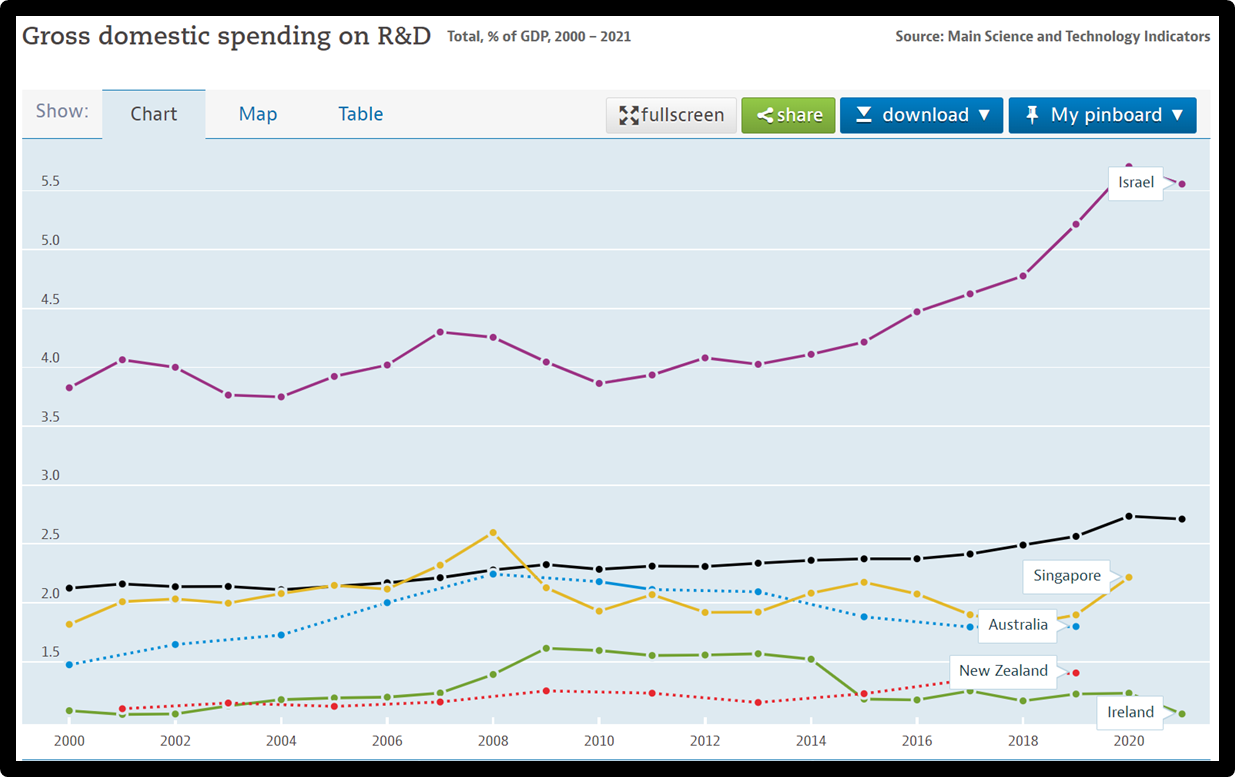Kia ora and shalom,
It has been a few weeks since the NZ Government released Budget 2023, and something important has been left out of the subsequent public discourse. I feel compelled to speak up about it as an advocate for New Zealand’s tech ecosystems.
In short…
New Zealand’s spending on R&D is in crisis.
There are numerous studies out there indicating spending on science and innovation can secure a country’s future economic prosperity. We all know this to be true, including our political leaders, who often talk about the importance of New Zealand's economy turning towards technology to meet the challenges of the future.
The reality is that the tech transformation we all want is just as far off as it was before the Budget announcement.
In Late in April, without any attention by the media, Stats NZ released the results of the 2022 research and development survey, showing the national spend on R&D, by Government, academic and private sectors.
Looking at the stats glass-half-full, they show that between 2020 and 2022, R&D expenditure reached $5.2 billion, up 11 percent. They show that the average R&D expenditure per entity increased 10% to reach $2.2 million. They also show that R&D expenditure as a proportion of GDP rose from 1.46% to 1.47%.
On the downside, the number of full-time equivalent (FTE) staff working on R&D stayed the same at 39,000 and that business sector R&D expenditure as a proportion of GDP actually fell from 0.87% to 0.86%.

*Source: Stats NZ
I guess you could say New Zealand’s R&D sector is slightly growing. Zooming out, the whole picture does not look good.
At 1.47%, New Zealand’s expenditure as a proportion of GDP is among the lowest in the OECD. At 0.86%, New Zealand’s business sector spend as a percentage of GDP is even further down the ranking. In fact, New Zealand’s total sector spend is almost half of the OECD average and more than 4% lower than what Israel spends!

*Source: Stats NZ
While there are other poorer countries in the OECD that spend less on R&D, within the group of small, advanced economies, only the Irish prioritize R&D less than New Zealand.
If you compare the most recent release to historical data, it’s business as usual.

*Source: OECD. The black line shows the OECD average.
As per the chart above, New Zealand’s spending on R&D since 2013 seems to grow at an average rate of .035% per year, but coming off relatively low historical levels, the increase in spending year-on-year is just not high enough given the declared aspirations.
Budget 2023: Window dressing for our R&D sectors.
The Government has previously indicated that it is committed to getting investment in R&D to 2% of GDP by 2028 as a way to 'help build a high-skill, knowledge-based and more productive economy'. Thus, when they released the budget last month, they proudly touted expensive initiatives to get us there:
$400 million to build three “multi-institution research, science and innovation collaboration centres” in and around Wellington, and $51 million to run them over the next four years.
$55.3 million for research fellowships and an applied doctoral training scheme.
$37.6 million set aside for New Zealand researchers to work on global challenges like climate change and health.
$160 million to support the burgeoning gaming tech sector.
And there is a 5 percent increase in funding for tertiary tuition from 2024 and ongoing commitment to the 15% R&D tax incentive.
These all sound great, but much of this funding has been allocated away from other initiatives, such as the wind-up of the National Science Challenges and the discontinuation of funding for the Centre of Asia-Pacific Excellence. It also appears that some of this funding will be used to replace ageing university assets.
If the Government intends to stay the course to reach 2% by 2028 (which is still well-below the OECD average), there is $150 million year-on-year deficit, accumulating since 2019 that needs to be closed. While the initiatives outlined above likely edge us closer to the target, the consensus is that it still just isn’t enough.
The Final Word.
New Zealand’s advancement towards a tech-based economy should not be assessed against progress made in previous years. Rather, its progress should be measured against that of other countries who are vying for the global pool of talent, funding, and resources. Certainly, there is a lot of catching up to do if it wants to keep pace with leading countries in the innovation race. Furthermore, it is not possible to wish for a tech transformation, and then surprise, surprise, it magically happens. It can only come as the result of a resolute intent to become an ‘innovation nation’ by the country’s decision makers and political leaders.






